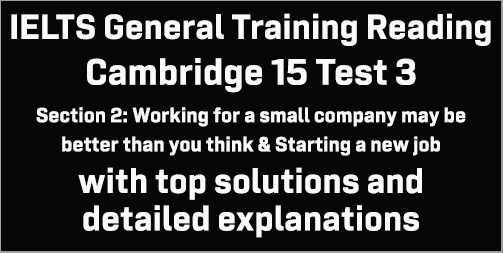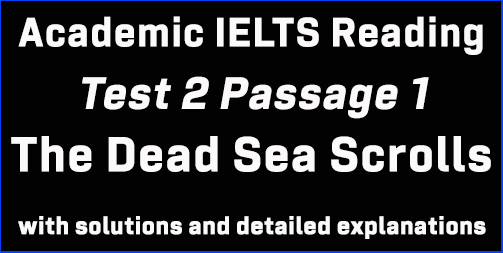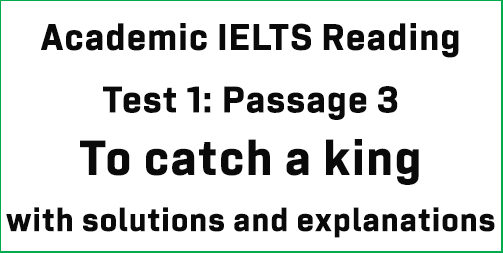IELTS General Training Reading: Cambridge 15 Test 3 Section 2; Working for a small company may be better than you think & Starting a new job; with best solutions and detailed explanations
This General Training IELTS Reading post focuses on solutions to IELTS Cambridge 15 Reading Test 3 Section 2 that has two texts titled ‘Working for a small company may be better than you think’ and ‘Starting a new job’. This is a targeted post for GT IELTS candidates who have big problems finding out and understanding Reading Answers in the GT module. This post can assist you the best to understand every Reading answer without much trouble. Finding out IELTS Reading answers is a steady process, and this post will assist you in this respect.
IELTS Cambridge 15 Test 3: GT Reading Module
Section 2:
The headline of the text: Working for a small company may be better than you think
Questions 15-20: Completing sentences with ONE WORD ONLY:
[In this type of question, candidates are asked to write a maximum of one word to complete sentences on the given topic. For this type of question, first, skim the passage to find the keywords in the paragraph concerned with the answer, and then scan to find the exact word.
TIPS: Here scanning technique will come in handy. Target the keywords of the questions to find the answers. Remember to focus on Proper nouns, random Capital letters, numbers, special characters of text, etc.]
Question 15: In a small business it is easy to become _______ with colleagues and other departments.
Keywords for this question: small business, easy to become, colleagues and other departments,
In the second paragraph of the text, the first lines say, “Working in a small organisation with a small workforce means it’s likely to be easy to become part of it. It won’t be long before you’re familiar with the staff and the departments that you need to deal with. . … .”
Here, the staff = colleagues, the departments that you need to deal with = other departments,
So, the answer is: familiar
Question 16: You may find you have ________ you were not aware.
Keywords for this question: may find, have, were not aware,
In the third paragraph, lines 1-3 say, “In a small business you’re likely to have considerable variety in your workload, including opportunities to work in different areas of the company, which will allow you to identify abilities that you didn’t know you had. .. ..”
Here, identify = find, you didn’t know = you were not aware,
So, the answer is: abilities
Question 17: Finding that your work is ________ will make you enjoy doing it.
Keywords for this question: Finding, will make, enjoy doing it,
Take a look at lines 4-5 of paragraph no. 3, “.. .. . This variety in your work will help to make it stimulating, so you have a good reason for getting out of bed in the morning.”
Here, you have a good reason for getting out of bed in the morning = make you enjoy doing it,
So, the answer is: stimulating
Question 18: Other people are likely to realise that you have ______.
Keywords for this question: Other people, likely to realise, have,
In lines 2-5 in the fourth paragraph, the author of the text says, “. .. . Because it’s much harder to overlook someone within a small workforce than a large one, your efforts are more likely to attract the attention of those higher up. You’ll have plenty of opportunities to show what you can do, and to have your potential noticed. … ..”
Here, more likely to attract the attention of those higher up = other people are likely to realise,
So, the answer is: potential
Question 19: Opportunities for ________ will come sooner than in a larger business.
Keywords for this question: Opportunities, will come sooner, than, larger business,
The last line of paragraph no. 4 says, “ .. . . The result is very likely to be that promotion comes to you faster.
Here, comes to you faster = come sooner,
So, the answer is: promotion
Question 20: You can benefit from a small company being more _______ than a large one.
Keywords for this question: can benefit from, small company, being, more, than, large one,
In the final paragraph (paragraph no. 5), have a close look at the first lines, “Small businesses are usually flexible, something that is rarely true of large organisations. This means that if they’re well managed, they can adapt to make the most of changes in the wider economy, which in turn can help you.”
Here, is rarely true of large organisations = small companies are more flexible than large companies, can help you = you can benefit from a small company,
So, the answer is: flexible
The headline of the text: Starting a new job
Questions 21-27: Identifying information
[This question asks you to find information from the passage and write the number of the paragraph (A, B, C or D … .. ) in the answer sheet. Now, if the question is given in the very first part of the question set, I’d request you not to answer them. It’s mainly because this question will not follow any sequence, and so it will surely kill your time. Rather, you should answer all the other questions first. And just like List of Headings, only read the first two lines or last two lines of the expected paragraph initially. If you find the answers, you need not read the middle part. If you don’t find answers yet, you can skim the middle part of the paragraph. Keywords will be a useful matter here.]
Question 21: the emotions that new employees are likely to experience at first
Keywords for this question: emotions, new employees, likely to experience, at first,
The answer can be found in paragraph C. Take a look at the first lines, “It can be a shock to join a new organisation. When you are a newcomer, feeling uncertain and perhaps a little confused, .. . ..”
Here, shock & feeling uncertain and perhaps a little confused = the emotions,
So, the answer is: C
Question 22: a warning to be patient at first
Keywords for this question: warning, be patient, at first,
Paragraph F starts with a warning, “Don’t try to do the job too soon. .. .. .”
Here, Don’t try to do .. .. . too soon = be patient,
So, the answer is: F
Question 23: how colleagues might react to certain behaviour
Keywords for this question: how, colleagues, might react, certain behaviour,
In paragraph C, the writer of the text says in lines 2-6, “ . .. .. .. there can be a strong temptation to talk about your old job and organisation as a way of reminding yourself and telling others that you really know what you are doing, because you did it in your previous role. Unfortunately, this will suggest that you have a high opinion of yourself, and that you think your old place was better. It has enormous power to annoy, .. ..”
Here, the lines suggest that your colleagues might be feeling annoyed when you are talking about your previous job and organisation.
So, the answer is: C
Question 24: travelling to your new workplace before you start working there
Keywords for this question: travelling to, new workplace, before, start working, there,
In paragraph A, the writer says in the beginning, “Make sure you know when and where you are expected to report on your first day. If the route from home is unfamiliar to you, make a practice run first; .. .. .”
Here, practice run first = travelling to new workplace before start working,
So, the answer is: A
Question 25: an example of observing an activity carried out within an organisation
Keywords for this question: example, observing, an activity, carried out, within, organisation,
In paragraph E, the writer of the text shares his or her own work experience, “When I worked for a television company, all of us, whatever our job, were strongly encouraged to visit a studio and see how programmes were made. .. .”
Here, and see how programmes were made = observing an activity carried out within an organisation,
So, the answer is: E
Question 26: some things that the organisation should arrange for when you begin
Keywords for this answer: some things, organisation, should arrange for, when, begin,
In paragraph B, the writer says, “You should expect to have an induction programme planned for you; a security pass; visits to whatever parts of the organisation you need to understand to do your job properly; .. . . .”
Here, an induction programme, security pass, visits to whatever parts of the organisation = some things … . organisation should arrange for you,
So, the answer is: B
Question 27: a division of jobs within an organisation into two categories
Keywords for this answer: division of jobs, within, organisation, two categories,
Take a look at the first line of paragraph D, “All employers have a core product or service paid for by customers
. .. .. .”
Here, core product & service are the division of jobs into two categories.
So, the answer is: D
Click here for solutions to Cambridge 15 GT Test 3 Reading Section 1
Click here for solutions to Cambridge 15 GT Test 3 Reading Section 3




Thanks alot for guiding us in detail .
Welcome!
Thanks a lot for explanation ❤️❤️
You’re welcome!